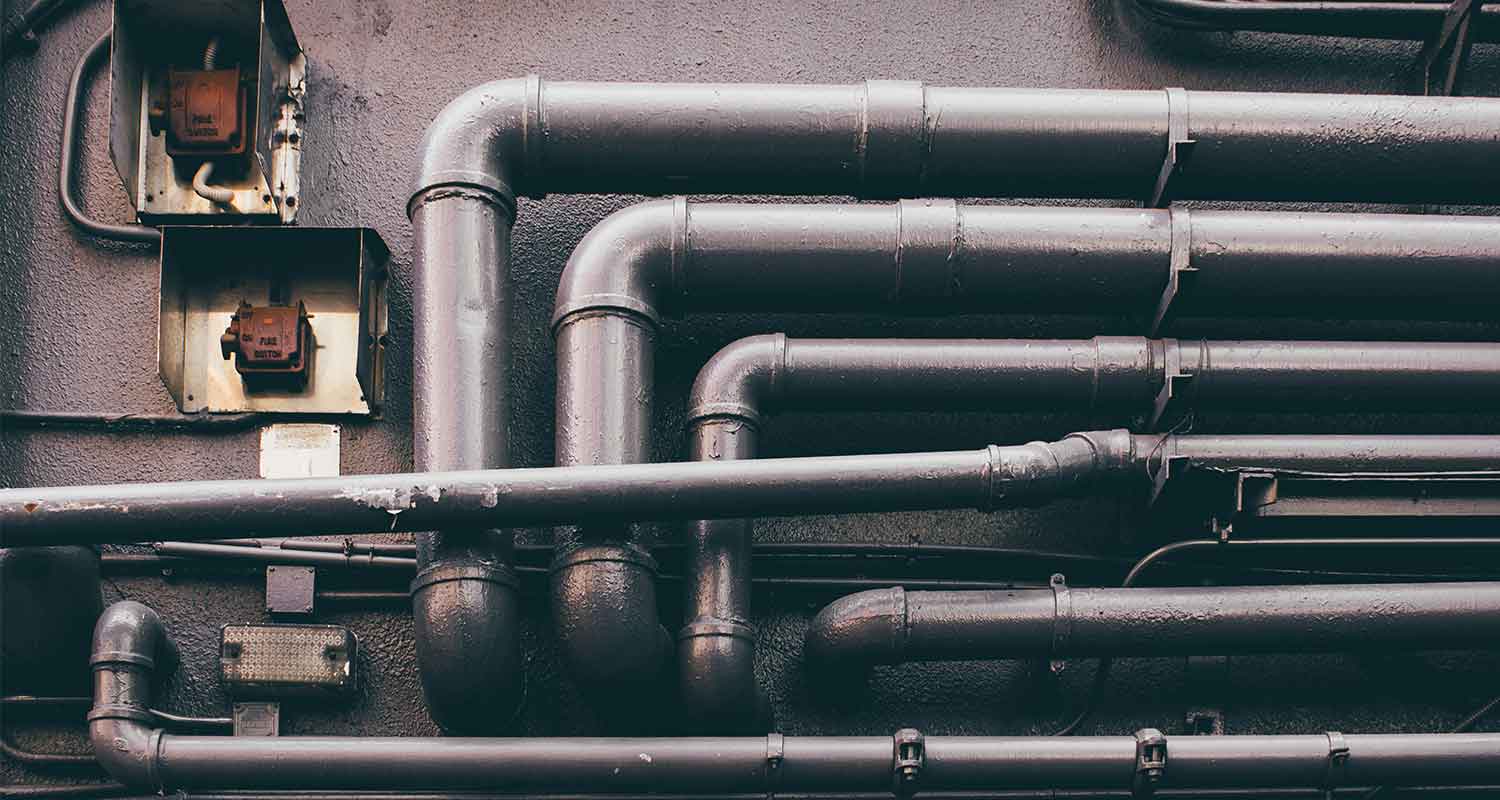Are you navigating the complex world of plumbing and stumbled upon the question: what’s the difference between residential and commercial plumbing? Look no further. Residential plumbing is all about addressing the needs within a home, with systems and fixes that are typically straightforward. Commercial plumbing, on the other hand, handles intricate systems in larger buildings, guided by stringent regulations. This overview introduces you to the key distinctions that affect installation, maintenance, and compliance in these two fields.
Key Takeaways
- Residential plumbing involves maintaining home water systems and is generally less complex than commercial plumbing, which requires specialized knowledge due to intricate systems in larger structures like office buildings.
- Commercial plumbing systems deal with higher usage demands and must adhere to stricter regulations, requiring more durable materials, frequent maintenance, and specifically designed fixtures to manage varying pressures and high flow rates.
- Both residential and commercial plumbing must comply with strict building codes, with commercial plumbing facing more rigorous standards; professionals in each field need appropriate licensing, experience, and knowledge of current regulations and technologies.
Exploring the Basics: Residential Plumbing Defined

The main focus of residential plumbing is to maintain water systems, appliances, and drain lines within personal dwellings like houses, apartments, and condominiums. The extent of work in the realm of residential plumbing ranges from basic repairs to overseeing intricate systems inside smaller-scale residential structures. Standard elements that make up a home’s plumbing system include water service conduits, supply pipes for clean water, drainage paths, waste removal vents, and heating units for hot water.
Residential settings often face commonplace issues such as leaks in pipeworks or malfunctioning toilets which can be aggravating but typically require uncomplicated solutions. Since these household-level systems are subjected to less strain compared to their commercial counterparts, and because there’s no need for specialized certifications amongst plumbers working on them. Resolving these problems tends to be swift and easygoing. For those residing in San Antonio, you have access to Chambliss Plumbing providing excellent residential services who has reliably catered high-quality assistance locally spanning three decades plus.
Unpacking Commercial Plumbing Complexities
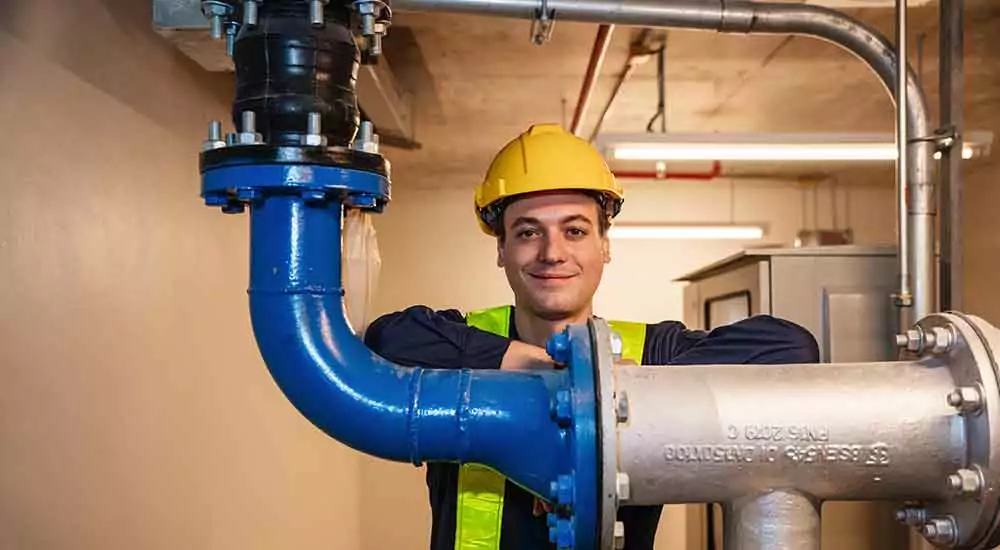
Let’s now focus on the realm of commercial plumbing. Essential in vast structures such as office buildings, these systems encompass extensive networks that control the flow and removal of water, essential for maintaining efficient operation within large facilities. The complexity of these systems demands specialized maintenance practices to prevent significant operational interruptions while ensuring compliance with environmental regulations and safeguarding occupant health.
In a commercial context where there is an increased demand due to higher occupancy levels and the need for uninterrupted daily operations, prompt and effective plumbing services are vital. Commercial plumbing entails dealing with more rigorous standards including substantial insurance requirements and adherence to particular building codes. Any malfunctions or breakdowns can lead to wide-ranging impacts necessitating immediate and decisive responses in order not only to minimize disruptions but also to mitigate potential health risks associated with such failures.
Key Variations in Plumbing Systems
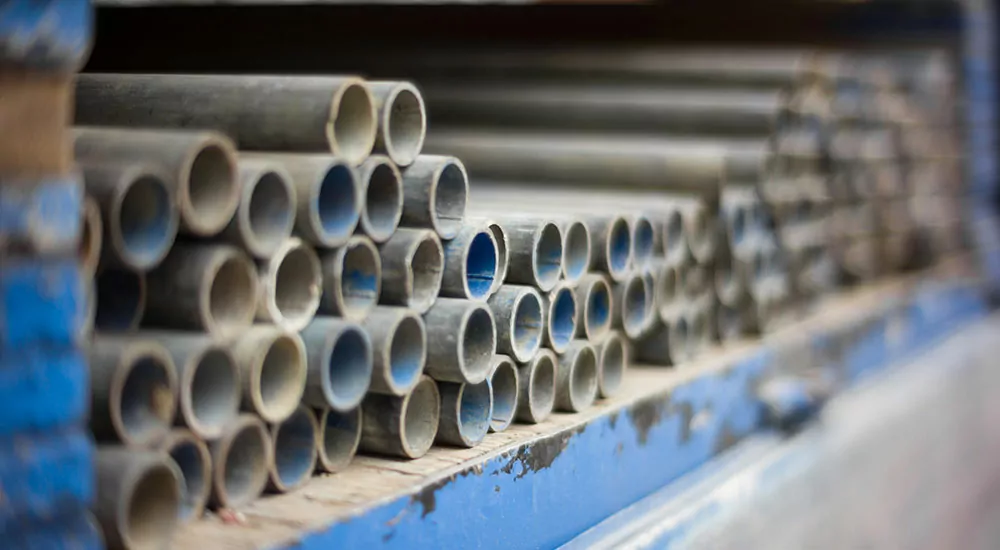
Grasping the primary distinctions between residential and commercial plumbing is essential for recognizing their unique characteristics. There are three principal areas where these differences manifest: the size and complexity of the system, the robustness of pipes and fixtures, and variations in water pressure as well as usage requirements.
Let’s delve into each one individually.
System Size and Scale
Due to the higher number of occupants in commercial buildings, these structures necessitate an extensive network of pipes and additional fixtures like sinks and toilets when compared with residential properties. To manage the greater water usage requirements stemming from both employees and customers, larger pipes are also imperative for a commercial plumbing system.
Plumbing systems within commercial establishments are engineered to serve potentially thousands of people. This is a stark difference from residential plumbing systems that cater to far fewer individuals. The sheer scope and magnitude imply that maintaining a commercial plumbing system involves complexities and specialized knowledge beyond what’s typically associated with residential plumbing maintenance.
Fixture and Pipe Durability
Commercial plumbing fixtures and the associated piping systems, due to their extensive use, require a level of durability that surpasses what is typically necessary for residential applications. To meet this need for robustness and resilience to frequent utilization, commercial plumbing routinely employs high-quality materials like copper, PEX (cross-linked polyethylene), and stainless steel, which offer both strength and flexibility under various usage conditions.
In the realm of commercial drainage solutions, cast iron emerges as a preferred material thanks to its long-lasting nature. Conversely, PVC pipes are not recommended for substantial above-ground drains in such settings because they do not fare well with exposure to elevated temperatures. Within the sphere of commercial plumbing operations where handling high water pressures is paramount and compatibility with hot as well as cold water transport is required. Copper pipes stand out as an optimal choice.
Water Pressure and Demand
The plumbing systems in commercial buildings, especially multi-story structures, have to contend with distinct challenges related to water pressure and demand. Ensuring robust water pressure is crucial for adequate water flow and the smooth operation of these systems. To deliver water effectively to upper floors in high-rise commercial properties, specialized equipment and techniques must be designed into the system.
To manage the intricacies involved in delivering consistent and secure water pressures across various floors of a building, many commercial entities implement solutions like pressure-reducing valves or create multiple pressure zones within their facilities. Industrial-grade appliances often necessitate steadier and more substantial water pressures than those found in residential settings for optimal performance. Thus:
- Ball Valves
- Gate Valves
- Globe Valves
- PEX Pipes
Are essential components that help regulate both flow rates and maintain precise levels of pressured control required by complex commercial plumbing installations.
Frequency and Scope of Plumbing Jobs
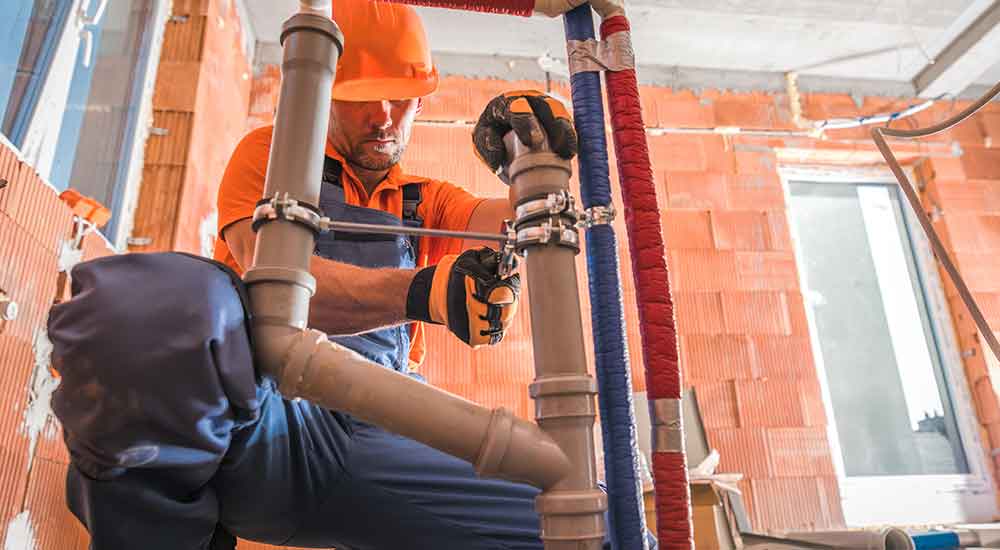
With large numbers of people frequently using commercial plumbing systems daily, it becomes necessary to promptly repair issues like clogged bathrooms to minimize disruptions. Detecting leakages and running water can be more complex in commercial spaces due to the large scale and less frequent use of some areas. This is in contrast to residential settings where homeowners quickly notice such issues.
While residential plumbers typically operate during standard weekday hours and are on call for emergencies during evenings and weekends, it’s not unusual for commercial plumbers to work beyond the standard eight-hour workday. This is to manage the broader scope and urgent nature of commercial plumbing jobs. Both residential and commercial plumbers are essential for maintaining the plumbing systems in various types of buildings.
Specialized Plumbing Services: A Closer Look
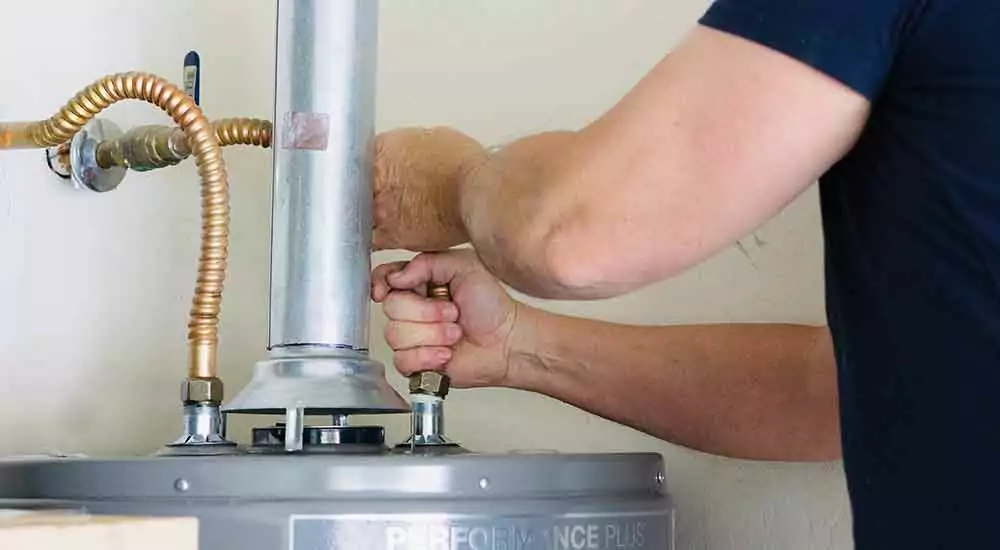
Commercial plumbing not only involves dealing with the larger scope and size inherent in commercial settings, but also includes providing tailored services designed to meet the distinct needs of these environments, such as specialized drainage solutions and catering to specific water heater requirements.
Drainage Solutions
Drainage issues in commercial plumbing are similar to those in residential systems but are intensified by the scale and usage of commercial properties. Clogged drains in high-traffic commercial areas require regular cleaning and more rigorous solutions like hydrojetting to prevent backups and slow drainage.
Additionally, sewer line problems in commercial buildings can lead to more significant issues like unpleasant odors and sewage backups, necessitating frequent inspections and maintenance. Efficiently addressing clogged bathrooms is critical in commercial settings as they impact a larger number of people and require immediate attention.
Water Heater Requirements
The domain of water heating illustrates a distinct difference between commercial and residential plumbing. In contrast to their residential counterparts, commercial water heaters are characterized by:
- Greater storage capacity
- Increased levels of gas input
- The ability for commercial models to store up to 250 gallons versus the maximum 100-gallon capacity found in residential models.
In the realm of commercial buildings, there is an increasing shift towards using electric and heat pump technologies for water heating. This transition is influenced by governmental policies that aim to decrease greenhouse gases as well as the demand for systems with improved energy efficiency.
Within commercial settings, it’s common practice to employ hot water recirculation systems so as not miss out on immediate access to hot water. These sophisticated systems integrate features such as:
- Pumps regulated by temperature control
- Enhanced comfort levels
- Added convenience
- Efficiency leading to conservation of water
The Importance of Adhering to Codes
Plumbing systems, both in residential and commercial settings, are governed by stringent building codes designed to promote safety, integrity, and functionality. Ignoring these regulations can lead to substantial financial repercussions including penalties, fines, the strain on budgets, as well as project delays or even full shutdowns.
The failure to comply with plumbing laws can result in costly legal disputes along with potential damage to one’s reputation. Building codes for commercial structures enforce strict standards for health and safety which help prevent issues like leaks and structural failures while ensuring sanitary conditions for occupants’ welfare. It is crucial that commercial plumbers have a thorough understanding of permits and regulatory requirements alongside budgeting concerns when carrying out installations so they may deliver reliable plumbing services safely and effectively.
Selecting the Right Plumber for Your Needs
In the domain of plumbing services, selecting an appropriate expert is crucial. A competent plumber should possess a robust mix of licensing, insurance qualifications, relevant experience and a well-regarded reputation. When it comes to residential plumbing needs, it’s important to ensure that your chosen professional has undergone proper training through either apprenticeship programs or trade schools. Check their license status to confirm they have adequate expertise in terms of training and are knowledgeable about the latest trends within the industry.
When dealing with commercial plumbing requirements, opt for a certified commercial plumber who adheres to legal regulations, stays abreast with current technologies and tools in the field, understands local municipal codes comprehensively, can facilitate smooth permit procurements as well as efficient job completions, and possesses a commendable record in their profession.
It’s advisable to review online feedbacks about plumbers you’re considering in order to guarantee first-rate service standards alongside high levels of professionalism from them.
Last but not least pay attention to customer support considerations such as promptness in response times accessibility post-sale assistance availability along with any warranties on offer. These aspects play an instrumental role when choosing exactly which plumber meets your specific demands. If located in San Antonio, consider engaging Chambliss Plumbing celebrated for deep-seated experiences coupled with superb standings could represent an idyllic choice catering individual household plumbing needs.
What you should do next
Residents of San Antonio seeking a trustworthy, certified, and skilled San Antonio plumber can confidently turn to Chambliss Plumbing Company. With an impressive track record of over three decades of serving the local populace, our team is fully prepared to address any plumbing requirement you may have.
For insight into what services we provide under the umbrella of residential plumbing, please visit our dedicated service page on residential plumbing where detailed information about this specialization is available.
Wrapping it up
In summary, residential and commercial plumbing systems possess similarities but are distinguished by considerable variations in size, complexity, and unique demands. Grasping these distinctions enables owners of properties to make enlightened choices when selecting appropriate plumbing services. Whether tackling a leaky faucet within a residential setting or embarking on an extensive plumbing endeavor in a commercial building, the correct insights and selection of the suitable plumber are crucial.
Frequently Asked Questions
What does commercial mean in plumbing?
Plumbers who focus on commercial settings are experts in the installation, maintenance, and repair of plumbing systems found within various types of commercial buildings including retail spaces, educational institutions, hospitals, etc. They manage the specific requirements associated with larger-scale plumbing systems typical to such environments.
What are the three main types of plumbing?
Three primary categories of plumbing systems exist: potable water, sanitary drainage, and stormwater drainage. Each system performs distinct functions and is designed for specific purposes within the realm of plumbing.
What type of plumbing is used in commercial buildings?
In commercial structures, plumbing systems frequently employ cast-iron fixtures for sewer lines and the distribution of water because they have a high tolerance to pressure and are capable of managing substantial volumes of liquids.
What are some common residential plumbing issues?
Damaged pipes, leaks, and malfunctioning toilets are frequent plumbing issues within residential settings that not only create inconvenience but also pose a risk of water damage.
Why are building codes important in plumbing?
Non-adherence to building codes in the realm of plumbing can lead to project setbacks, fines, or even forced cessation, as these regulations are crucial for maintaining the safety, integrity, and efficiency of plumbing systems.
